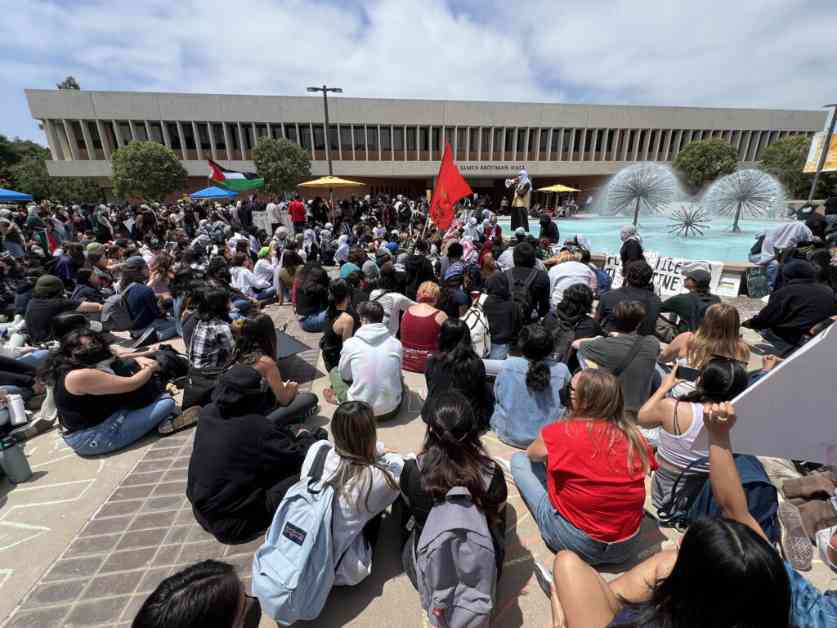California State University, Long Beach is embroiled in a controversy surrounding its policy on amplified sound, with allegations that the rules infringe on free speech rights and have been selectively enforced against faculty members critical of the institution. The American Civil Liberties Union of Southern California recently sent a letter to campus leaders on behalf of two faculty members who were warned for violating the school’s sound amplification policies during a teach-in on Palestine last spring.
Challenges to Sound Amplification Rules
The ACLU attorney, Jonathan Markovitz, argued that the university’s regulations on devices like megaphones and microphones are unconstitutional and may have been enforced in a discriminatory manner due to disagreement with the professors’ political speech. Cal State Long Beach spokesperson, Jeff Cook, maintained that the campus policies related to ‘Time, Place, and Manner’ are viewpoint-neutral, despite the concerns raised by the ACLU.
The situation at Cal State Long Beach underscores the broader trend of universities across the country revising their policies on assembly in response to pro-Palestinian protests. While university officials claim these changes are aimed at fostering the exchange of ideas, critics fear that the restrictions could stifle free speech. The California State University Chancellor’s Office recently introduced a systemwide time, place, and manner policy following legislative mandates to inform students of free speech rules at the beginning of each academic year.
The ACLU’s letter, advocating for professors Sabrina Alimahomed-Wilson and Jake Alimahomed-Wilson, raised questions about the enforcement of sound amplification restrictions at Cal State Long Beach. The letter urged the university to cease enforcing these rules until they could be revised to align with constitutional standards. The professors’ involvement in a teach-in on Palestine sparked the issue, highlighting the complexities of balancing free speech with campus regulations.
Reflections on Past Events
The teach-in at Cal State Long Beach last spring, which led to the current dispute, involved a series of speakers addressing the Palestinian cause. Despite encountering technical difficulties with the amplification equipment, the faculty members persisted in delivering their messages on topics ranging from the university’s ties to defense contractors to the intersection of feminism and Palestine. Their subsequent article critiquing the university’s relationship with Boeing drew attention to the institution’s complicity in global conflicts.
The faculty members recalled the teach-in as a pivotal moment of academic expression and social activism, culminating in a call to action against corporate influence on campus. However, their efforts were met with warnings of policy violations at the start of the fall semester, signaling a shift in the university’s approach to dissent and public discourse. The timing of the warnings raised suspicions of targeted surveillance and intimidation, prompting concerns about the chilling effect on academic freedom.
Legal Challenges and Constitutional Concerns
Markovitz’s letter to the university administration raised several constitutional concerns regarding the sound amplification policy, arguing that the restrictions were overly broad and potentially infringed on free speech rights. The lack of clarity in the policy’s language and its selective enforcement further fueled suspicions of viewpoint discrimination against dissenting voices on campus. The faculty members’ history of using amplified sound for advocacy and educational purposes underscored the arbitrary nature of the warnings they received.
The ACLU’s intervention highlighted the need for universities to uphold the principles of free speech while maintaining order on campus. The debate over sound amplification rules at Cal State Long Beach mirrored larger discussions about the limits of protest and dissent in academic settings. As the university grappled with the fallout from the teach-in, questions arose about the balance between administrative oversight and faculty autonomy in shaping campus discourse.
Implications for Academic Freedom
The faculty members involved in the teach-in emphasized their commitment to social justice and academic freedom, viewing their activism as an extension of their teaching and research responsibilities. By engaging with students on issues of militarism, colonialism, and oppression, the professors sought to inspire critical thinking and civic engagement within the university community. The warnings they received highlighted the risks of challenging institutional power and corporate influence in higher education.
The broader implications of the sound amplification dispute at Cal State Long Beach resonated with faculty members and students alike, raising concerns about the erosion of academic freedom and the stifling of dissenting voices. The role of universities in safeguarding free speech and intellectual diversity came into question, as the institution grappled with competing demands for order and open debate. The tensions between policy enforcement and constitutional rights underscored the complexities of navigating academic discourse in an increasingly polarized society.
Calls for Reform and Reconciliation
In light of the ongoing controversy, advocates for free speech and academic freedom urged Cal State Long Beach to reconsider its approach to sound amplification and protest regulations. The need for transparent and inclusive dialogue between the administration, faculty, and students emerged as a critical step towards resolving the underlying tensions on campus. By addressing the concerns raised by the ACLU and other stakeholders, the university could reaffirm its commitment to fostering a vibrant intellectual community.
Moving forward, the faculty members involved in the teach-in expressed hope for a constructive resolution that upheld their rights to free expression and assembly. The lessons learned from the sound amplification dispute underscored the importance of vigilance in defending academic freedom and confronting institutional power dynamics. As Cal State Long Beach grappled with the aftermath of the teach-in, the legacy of activism and advocacy continued to shape the campus climate and the ongoing dialogue on free speech rights.




















